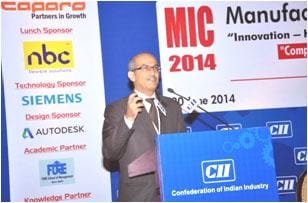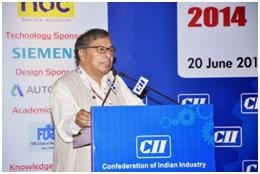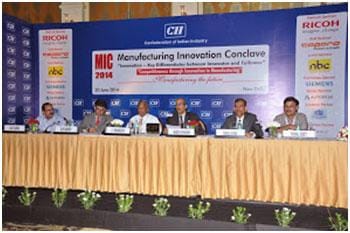As the knowledge partner for Manufacturing Innovation Conclave, held in The Leela Palace, New Delhi on the 20th June 2014, BMGI presented how novation differentiates between Innovator and follower. The event was organized by Confederation of Indian Industry (CII) that works to create and sustain an environment conducive to the growth of industry in India.
The event was organized by Confederation of Indian Industry (CII) that works to create and sustain an environment conducive to the growth of industry in India.
The event comprised thought leaders from across the world with senior management representations from reputed organizations like Maruti, Rolls –Royce India Ltd, Siemens, HCL Infosystems Ltd., Amtek Auto Ltd., Punj Lloyd Ltd, WNS Global services, Polaris India Private Limited to name a few and representations from industrial & governing bodies like National Manufacturing Competitiveness Council, Government of India and CII State Council.
The event was organized into four sessions. While the inaugural session focussed on how innovation acts as a key differentiator in organizations, the second session reflected how innovation how Innovation and leadership are related. A panel discussion to discuss measuring the impact of innovation effortsin Indian industries in the post lunch session and the closing session focused on how innovation plays a critical role in manufacturing.
Mr Jayant Davar, Immediate Past Chairman, CII (NR) welcomed the audience and set context with the example of the light bulb as innovated by Sir Thomas Edison. He introduced the speakers and shared that while India is an entrepreneurial company only 1% or less its GDP being is invested in R&D.He underscored thatthe philosophy of Jugaad does not work everywhere.
Mr Naresh Shahani, Founder & Managing Director, Breakthrough Management Group India (BMGI)focussed on the theme – Innovation as key differentiator between Innovator and follower. Innovation a key driver of competitiveness,helps firms develop new products and processes while impacting environmental and social conditions.  He pointed that only 7 of the 30 BSE Sensex companies from 30 years ago were still a part of the index. He went on to emphasise that consumers are adopting technology much faster leading to very short product life cycles. This demands building an ‘Innovation DNA’ by going back to fundamentals and supporting new ideas. These views were echoed through the remainder of the conclave.Mr Shahanioutlined dimensions which are required for thriving innovation culture and showcased D4 methodology, one of the most powerful structures to nurture Innovation.
He pointed that only 7 of the 30 BSE Sensex companies from 30 years ago were still a part of the index. He went on to emphasise that consumers are adopting technology much faster leading to very short product life cycles. This demands building an ‘Innovation DNA’ by going back to fundamentals and supporting new ideas. These views were echoed through the remainder of the conclave.Mr Shahanioutlined dimensions which are required for thriving innovation culture and showcased D4 methodology, one of the most powerful structures to nurture Innovation.
Mr MM Singh,Co-Chairman,Regional Committee on Manufacturing Competitiveness, CII(NR) shared how his team saved more than 100 million INR by through over 2000 innovative ideas from shop floor. Mr Singh also stated that NPD of India has not grown significantly in last 30 years and domestic strength will decide how much we will innovate in future.
The chief guest of the event, Mr Ajay Shankar, Member Secretary, National Manufacturing Competitiveness Council, Government of India felt that success in Manufacturing Industry without innovation is going to be tough and manufacturing growth rate after 80’s have not been shifted.In his keynote he further stated that our feudal culture often resulted in our delayed global integration whereas China has gone ahead with 30% excess capacity across its manufacturing spectrum.  Despite this Mr.Shankar felt India has the capability to be globally competitive, since most Fortune 500 companies continue to aggressively hire R&D staff at their India centres. He suggested that Indian manufacturing needs to think big while keeping in mind the capital constraints faced by most companies and thereby endorsed the concept of frugal innovation.
Despite this Mr.Shankar felt India has the capability to be globally competitive, since most Fortune 500 companies continue to aggressively hire R&D staff at their India centres. He suggested that Indian manufacturing needs to think big while keeping in mind the capital constraints faced by most companies and thereby endorsed the concept of frugal innovation.
Mr Sameer Gupta, Vice Chairman, CII Uttar Pradesh State Council summarized the inaugural session and provided the concluding remarks, flagging the way for the second session that was chaired by Dr Jitendra K Das, Director, Fore School of Management.
Speaking on the topic ‘Leadership and Innovation’ session Dr. Jitendra K Das, Director, FORE School of Management astutely put the onus of identifying an efficient path of innovation on the top management of companies. He also mentioned how to integrate technology with innovation and to deploy innovation we have go much beyond our current efforts.
Bringing the customer into the innovation process, Subhankar Lahiri, Head, Manufacturing Vertical, Ricoh India, was of the opinion that engaging customers in the process of product creation was essential to brand building. He mentioned how 10types of Innovation is required to build the innovation culture. He gave examples of Walmart, Google, Quikr, OLX and Samsung as how new different innovative models are used presently. He further noted how video games have changed from small TV games to Play Stations.
Dr. MaghinTamilarasan, Director Strategy and Business Development, Rolls-Royce India, stated that staying in the ahead in the innovation game means investing significant amounts in R&D and by partnering with research institutes. Sharing that the key is having a clear vision for innovation and involvement of all employees in idea generation, he noted that innovations should be rewarded and recognized more often.
Providing an engineering point of view, Rahul Sehgal, Director – Business Consulting & Strategy, Siemens Industry Software (India) Pvt. Ltd, sharedthat Siemens, a driver for Innovation in Automation for decades, has been working on“Cyber Physical Systems” or machine to machine (M2M) conversations that would be the way forward for the world as is being demonstrated by Industry 4.0, a high-tech strategy project in Germany. He observed that it would only be imperative to create an Innovation ecosystem jointly with suppliers and customers.
Speaking about “Democratization in Innovation”, Rajiv Bajaj, Country Manager – Manufacturing Solutions India and SAARC, Autodesk India PVt. Ltd, emphasized that innovation is about bringing ideas and deploying successfully and Innovation clubbed with designs could do wonders. He talked about how internet in aircrafts is changing lives with new innovations developed. . Mr Bajaj noted that High-tech systems have more value when they are “democratized” as highlighted by The Innovation Genome Project that aims to make each personan agent of innovation. The spark for innovation is to realise that there is a better way to do things according to Mr Bajaj.
Mr Naresh Shahani moderated of the panel discussion on the topic ‘Measuring the impact of Innovation efforts’.  Pankaj Dubey, Country Head and MD, Polaris India felt lean innovation is the “core” innovation. He stressed that there is no better time for innovation in the way of work, in the equipment that we use; leveraging the cost of capital to address the scale to produce world class products. Taking this thought forward Manoj Kumar, Executive Vice President & CEO, Ricoh India Pvt. Ltd., insisted on monitoring innovative products during the gestation period since not all are instantly successful. He warned that the real challenge is scaling up and being more competitive in order to reach the next level that is inevitable. Bringing the discussion back to the importance of the customer JV Ramamurthy, President & COO, HCL Infosystems Ltd, maintained that innovation was essentially driven by focusing on the “bottom of the pyramid”. He stated that how internet technology has developed and products and services are ever changing from 2Gs to 3Gs.Vijay K Arora, Director, Amtek-Auto, provided the example of how Apple innovates to lead and not for survival which should be the mantra for innovation. On the prospect of India becoming a manufacturing hub like China, Mr. Arora felt India’s logistical challenges hamper efficiency that prevents us from achieving this goal and hoped that the new government will address these roadblocks and stated “Acche din aanewaalehain” (Good Days are ahead, in Hindi).
Pankaj Dubey, Country Head and MD, Polaris India felt lean innovation is the “core” innovation. He stressed that there is no better time for innovation in the way of work, in the equipment that we use; leveraging the cost of capital to address the scale to produce world class products. Taking this thought forward Manoj Kumar, Executive Vice President & CEO, Ricoh India Pvt. Ltd., insisted on monitoring innovative products during the gestation period since not all are instantly successful. He warned that the real challenge is scaling up and being more competitive in order to reach the next level that is inevitable. Bringing the discussion back to the importance of the customer JV Ramamurthy, President & COO, HCL Infosystems Ltd, maintained that innovation was essentially driven by focusing on the “bottom of the pyramid”. He stated that how internet technology has developed and products and services are ever changing from 2Gs to 3Gs.Vijay K Arora, Director, Amtek-Auto, provided the example of how Apple innovates to lead and not for survival which should be the mantra for innovation. On the prospect of India becoming a manufacturing hub like China, Mr. Arora felt India’s logistical challenges hamper efficiency that prevents us from achieving this goal and hoped that the new government will address these roadblocks and stated “Acche din aanewaalehain” (Good Days are ahead, in Hindi).
The concluding session focused on the critical role of Manufacturing– Innovation Excellence andsession chairman Ms Shammi Pant,Sr. Director, WNS Global Services set the context and introduced the speakers. She stressed the need to produce more with less use of raw material and with lower waste generation.
She found agreement from Dr. Zubin Varghese, Sr. Director Innovation & Advanced Engineering, Ingersoll Rand, who stressed on the need to explore innovative ways to ensure clean air, safe food and energy efficiency. He insisted on the need for discipline and rigour in the process of innovation which includes validating ideas, prioritising and measuring them through milestones. This discipline includes courage to “kill a project” that does not meet expectations. He stressed on the importance of having innovative products & services that will make difference in the market.
Speaking about “Product Innovation for New Product Development” within this last session, Ajeet Thakur, Country Manager, Creaform BU Ametek, India was of the view that as technology evolves it adds value to the customer and brings down cost, part of this evolution is incremental advancement which happens when companies add features to an existing product. He further stated,Technology and innovation are powerful tools for change and as we begin to face up to the multiple economic, environmental and social challenges of our time, innovation in technology offers the solutions at the speed and scale required.
Answering a question about India’s ability to compete in aircraft manufacturing Ashok Wadhawan, President – Manufacturing Business Punj Lloyd believed on the urgent need for Indian companies to form a consortium like China did for its new fighter jet since Indian companies lack the capability to execute such large projects alone.In order for the right environment for innovation, it should start from the top with leadership defining how much of the business should be a result of the innovation. Dr. Varghese shared this thought when he said companies needed to collaborate and invite other companies to view their products and innovation in reply to a question about making open innovations. Thus the way forward for Indian innovation is through collaboration and cooperation.
About BMGI
BMGI is a global consulting firm that specializes in providing management consulting solutions in strategy, innovation, problem solving and business transformation. Headquartered in Longmont, USA, BMGI has offices in 13 countries around the globe. In India, BMGI is located in Mumbai.
BMGI’s business strategy consultants work with organizations to build and execute successful strategy implementation and drive growth. BMGI leads in building a culture of innovation across the enterprise that transcends from top management to the lowermost execution level. BMGI partners with organizations in leveraging and promoting innovation. BMGI helps organizations solve problems harnessing the power of cutting edge techniques. BMGI’s Problem Solving capabilities have made it known world over as the best operations excellence consulting firm.
BMGI with its deep understanding of changing trends in nature of markets, preferences of customers and expectations from stakeholders offer the Business Advisory Services to its clients to help them align with the right designing and execution of strategy for successful businesses transformations.
A few major clients BMGI has worked with in India include Volkswagen, John Deere, Fiat, Daimler, Bajaj Auto, Reliance Industries, ITC, Vodafone, Asian Paints, L&T, Accenture, and Oracle.
For More Information, Contact:
Varun Chugh
Phone : +91-22-40020045
Email : press@bmgindia.com
